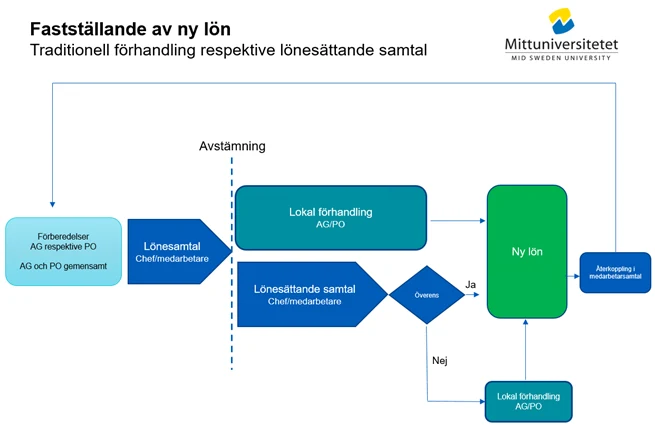How does the salary review work?
Salary reviews take place either through salary-setting discussions or local negotiations, depending on which union affiliation you have as an employee.
Salary reviews are done either through:
- Salary-setting discussions (SACO-S members) - between manager and employee
- Local negotiation (OFR) - between the authority's negotiator and the local trade union organisation
Salary-setting discussions – dialogue between manager and employee
What are salary-setting conversations?
In short, salary-setting discussions mean that an employee's new salary is determined directly in conversations between the salary-setting manager and the employee, instead of in negotiations between the employer and the union. The salary-setting manager and the employee have a dialogue about the employee's work efforts and salary, based on the organization's mission/goals and based on Mid Sweden University's salary criteria.
Managers and employees have a responsibility to create the conditions for and to contribute to the implementation of salary-setting discussions.
Here's how it works:
- Manager and employee have salary discussion (call 1)
- The purpose of the salary discussion is for employees and the salary-setting manager to work together on the salary criteria and have a dialogue about how the work has gone over the past year, evaluate performance and give and receive feedback. In this conversation, the employee appraisal is followed up.
- The purpose of the salary discussion is for employees and the salary-setting manager to work together on the salary criteria and have a dialogue about how the work has gone over the past year, evaluate performance and give and receive feedback. In this conversation, the employee appraisal is followed up.
- Manager and employee have a dialogue about the employee's new salary (conversation 2)
- A short conversation where the salary-setting manager makes a proposal for a new salary. The conversation is not a negotiation, but a dialogue in which the manager must clarify the connection between the salary criteria and the new salary.
- The goal is for the employee to understand the basis on which the new salary is set.
- Employees and managers sign an agreement on a new salary.
- Possibility of reflection period, if desired, before an agreement on a new salary is signed. If, after a period of reflection, the employee does not agree with the salary-setting manager, the parties encourage another conversation to reach an agreement.
- If the employee and manager do not reach an agreement, the new salary is determined in a local negotiation between the employer and SACO-S's negotiating delegations. In the local negotiations, the delegation must ensure that the salary is set in accordance with current salary criteria and that the process for salary-setting discussions has been fulfilled.
In cases where the employee does not show up for the salary-setting discussion without a valid reason despite the manager having called for a conversation in good time, the manager decides on a new salary.
The new salaries will be paid when all salary-setting talks have been completed and any local negotiations have been concluded.
Local negotiation – between the employer's representative and the union negotiators
- Managers and employees have salary discussions.
- The purpose of the salary discussion is for employees and the salary-setting manager to work together on the salary criteria and have a dialogue about how the work has gone over the past year, evaluate performance and give and receive feedback. In this conversation, the employee appraisal is followed up.
- The employer's negotiating delegation forwards the manager's salary offer to OFR's negotiator.
- The employer, the negotiating delegation and the negotiators go through and have a dialogue about the salary offers.
Salaries are determined and negotiation protocols are drawn.
Create the conditions for a good conversation
- Salary-setting managers and employees must be well prepared.
- With mutual respect and openness, a dialogue is conducted about the employee's work tasks, performance, where both the salary-setting manager and the employee justify their assessments of performance and results, individual goals, goals linked to the performance appraisal, and expectations for salary and salary development.
- Both manager and employee take responsibility for processing what has emerged in the conversation and are open to continued dialogue.
Absent employees
- Full leave of absence at the time of the audit (does not apply to parental leave and illness) is not covered by the salary review. Upon return to work, a review of the salary is carried out where there may be a need for a salary adjustment based on a missed audit round.
- Those on parental leave and those on sick leave will be offered salary discussions and salary-setting discussions.
- Employees are paid according to the performance they would have been expected to achieve if they had been working
